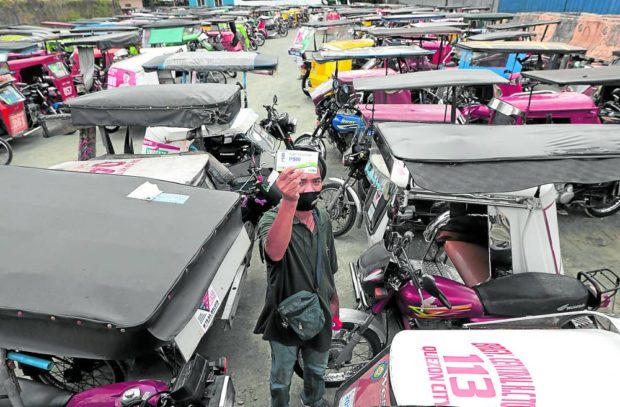Gov’t eyes sale of cheaper fuel to PUVs – PNOC

HIS PRECIOUS | A tricycle driver in Quezon City shows his P500 voucher. He is one of the first 3,000 recipients of the fuel subsidy being distributed through the local government at Quezon Memorial Circle on Tuesday. Across the country, many drivers of public utility vehicles are reeling from soaring fuel prices and have begun to think of switching jobs as their income shrinks. (GRIG C. MONTEGRANDE / Philippine Daily Inquirer)
MANILA, Philippines — The state-owned Philippine National Oil Co. (PNOC) is planning to start next month the sale of fuel at a discount to targeted beneficiaries as prices at the pump continue to rise to unprecedented levels.
Newly installed PNOC president Jesus Cristino Posadas said during Monday’s Senate hearing that the subsidies meant to help the transport sector would be pooled to buy fuel from oil industry players that, in turn, would be sold by participating gas stations at a lower price to drivers of public utility vehicles (PUV).
Posadas said PNOC would focus on buying diesel as it continues to register bigger increases among petroleum products and is the usual fuel used by drivers because it is traditionally cheaper.
The government has set aside P5 billion as fuel subsidy for PUV drivers.
In terms of additional funding, Posadas quoted Finance Secretary Carlos Dominguez III as saying that this could be secured by PNOC from either Land Bank of the Philippines or Development Bank of the Philippines.
Article continues after this advertisementOil deregulation revision
PNOC is also looking at leasing storage capacities from oil players “to be able to replace the fuel stock after its release to the beneficiaries and pay back the financing institutions concerned,” he added.
Article continues after this advertisementPosadas said PNOC was also ready to accept proposals from industry players that would allow the government to set up a petroleum reserve, which can help minimize the impact of accelerating oil prices in the global market.
In Congress, the House energy committee on Tuesday approved a substitute bill amending Republic Act No. 8479, or the Downstream Oil Industry Deregulation Act of 1998.
The bill seeks to establish minimum inventory requirements for oil products and unbundle the prices of petroleum, among others.
The House energy committee also urged President Duterte to call for a special session of Congress to deliberate on the bills to address the nonstop increases in the prices of oil and petroleum products.
Marikina City Rep. Stella Quimbo, one of the authors of the consolidated bill, pointed out that the prices of gasoline, kerosene, and diesel have increased by 17.8 percent, 26.8 percent, and 35.6 percent since Feb. 21 this year.
She explained that a public utility jeepney that uses 25 liters a day and runs 24 days a month would now have to pay an additional P11,880 a month.
“Since most, if not all, products and services use gasoline products for production and distribution, we expect inflation to increase substantially,” she said.
Quimbo also proposed that the President be granted the power to suspend or decrease fuel excise rates when the Dubai crude price reaches $80 a barrel.
“This way, we could balance the interest of the people while maintaining a deregulated market,” she said.
The bill was approved subject to form and style.
Unduly benefit the rich
Meanwhile, the spokesperson of the Department of Finance (DOF) on Tuesday defended the agency’s opposition to the suspension of taxes on fuel, saying this would not only deprive the government of much-needed funds but also unduly benefit richer people who consume more fuel.
Speaking at the Laging Handa public briefing, Finance Assistant Secretary Paola Alvarez said the government should just continue with its “targeted support” to vulnerable sectors such as fuel discounts and fuel subsidies to public transport workers and farmers and fishermen.
Citing government data, Alvarez said that 48.8 percent of the country’s fuel consumption was in high-income households compared to just 13.8 percent in lower-income households.
The DOF official explained that under the tax reform program of the Duterte administration, those who consume more and could afford to do so should pay more taxes and these taxes would then be used to uplift the poor. If the fuel taxes are removed, the ones who will benefit will be the richer households that consume more oil.
“So basically it’s the rich you are giving the subsidy to because they’re the ones given relief with the removal of the excise tax on fuel,” she said.
“We are seeing that this spike [in oil prices] is just temporary and if we reduce our taxes, we will be affected more. So it’s better to just give subsidies so that we can cross over this temporary economic crisis,” she said.
According to Alvarez, the government has already allotted P5 billion as part of its “Pantawid Pasada” program for PUV drivers and has so far raised P3 billion. For the farmers, the government has initially allocated P500 million in subsidies and this would be increased to P1.1 billion soon.
RELATED STORIES
Oil firms set biggest increase in fuel prices
DOTr urged to slow down jeep modernization amid rising fuel prices